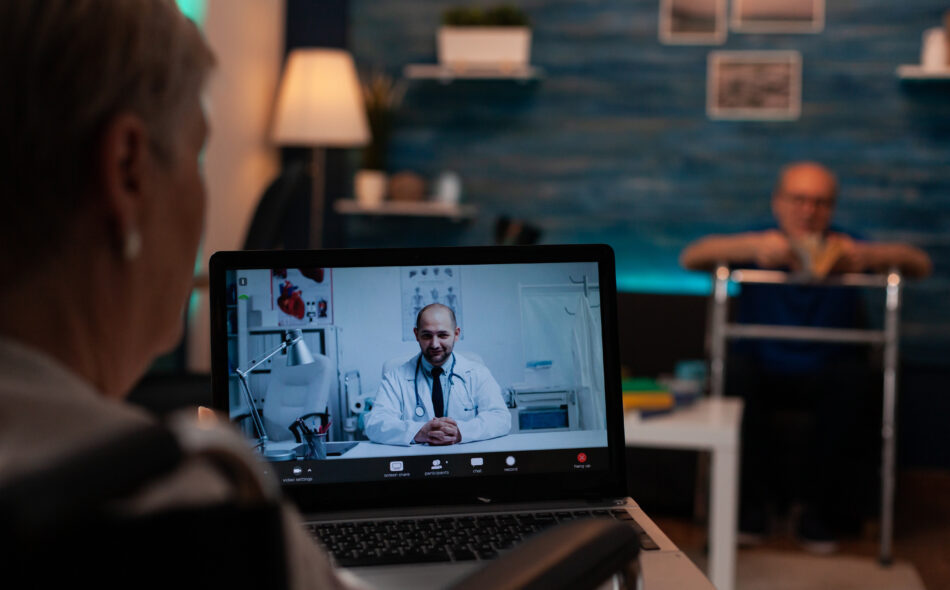The first time I did a VRI session, I wasn’t sure what to expect. I had already been working as an over-the-phone (OPI) interpreter. I knew the routine, listen, interpret, stay invisible. My voice was the only bridge between patients and providers. But VRI was different. Suddenly, I wasn’t just a voice anymore. I had a face. And so did they.
I remember logging in to my first VRI session. A young woman sat in a hospital gown, her eyes darting between the doctor and the screen. The moment she saw me, she visibly relaxed. I smiled and nodded, a simple gesture, but one that said, I’m here. You’re not alone in this. That was the moment I understood how VRI changes everything.
Seeing Each Other
With OPI, it’s easy to become robotic. You focus on accuracy, tone, pace, but you’re floating in the ether, detached from what’s physically happening. VRI grounds you. You can see if the patient is scared, confused, or in pain. You can catch the subtle nonverbal cues, a frown, a shrug, a hesitant glance, that often carry more meaning than the words themselves.
Once, during a VRI session in the ICU, a middle-aged man who had just received a cancer diagnosis turned to look at me after the doctor stepped out. He didn’t say anything. He just looked. And I looked back. We held eye contact for maybe five seconds, but it felt like a lifetime. I saw the fear in his eyes. He saw the quiet understanding in mine. That moment didn’t need translation.
The Interpreter Becomes Visible
One thing I’ve learned through VRI is that people look at you differently when they can see you. As interpreters, we’re trained to be neutral, to not insert ourselves emotionally. But when your face is on a screen, you become part of the room, whether you like it or not. Patients often talk to me directly, ask me questions, even thank me with a smile or a wave when the session ends.
There’s a level of responsibility that comes with that visibility. I’ve learned to keep my expressions neutral but warm, my posture steady, my eyes attentive. It’s a delicate dance, being present enough to build trust, but not so present that you overshadow the actual medical dialogue.
Challenges Behind the Camera
Of course, VRI isn’t perfect. There are times when the Wi-Fi drops or the video lags. I’ve had sessions where the camera angle only showed the back of the doctor’s head or cut off the patient completely. I’ve had to interpret in rooms with harsh fluorescent lights glaring into the lens or where background noise made it almost impossible to focus.
And then there’s the emotional toll. Being seen all day takes energy. There’s no “rest face” when you’re constantly on-screen. Every moment is a performance of professionalism, calm, and empathy, even when the stories you interpret break your heart.
Why It Matters
Still, I’ll take VRI over OPI any day when it comes to emotionally charged moments. When a mother is told her child needs emergency surgery, or when a patient hears that the tests show something serious, being able to look them in the eye, even through a screen, matters. It humanizes the experience. It reassures them that the person translating their fears and hopes is not a machine, but another human being who cares enough to look them in the eye and stay steady.
Through VRI, I’ve had patients reach out toward the screen, wave goodbye, or whisper a quiet thank you just before the call ends. I’ve seen tears, smiles, confusion, and relief, all of it unspoken, all of it real.
Closing Thoughts
VRI doesn’t just change the dynamic, it deepens it. It bridges not just language, but presence. It allows us to offer more than just interpretation. We offer connection, and in moments of vulnerability, that’s often what people need the most.
When our eyes meet through the screen, we remind each other: you’re not alone.
Disclaimer: The views and opinions expressed in these blog entries are solely those of the author and do not necessarily reflect the official policy or position of the company. Any content provided by the author is of their opinion and is not intended to malign any religion, ethnic group, club, organization, company, individual, or anyone or anything.


透過這個小小視屏 , 我進入一個新世界
在這個世界裡,我只能算是位過路客
這世界有愛,有希望,
也有人害怕,也有人沮喪。
透過這個小小視屏,我不再猜疑不在幻想。
眼看的每一份笑容,每一顆眼淚,
都在肯定得細訴他們的故事。
沒有一絲毫的虛假,也不必偽裝,
我就見證了他們生命裡短暫卻最真實的一幕,
若非刻骨銘心,也算難以忘懷。
我雖只是一位過路客,
我慶幸我的一言一語,減輕了他們當下所需。
我感恩他們的分享,他們對我的信賴,
這也是我對這份工作的真誠與對動力。
Nicely written! congratulations again on your conversion!